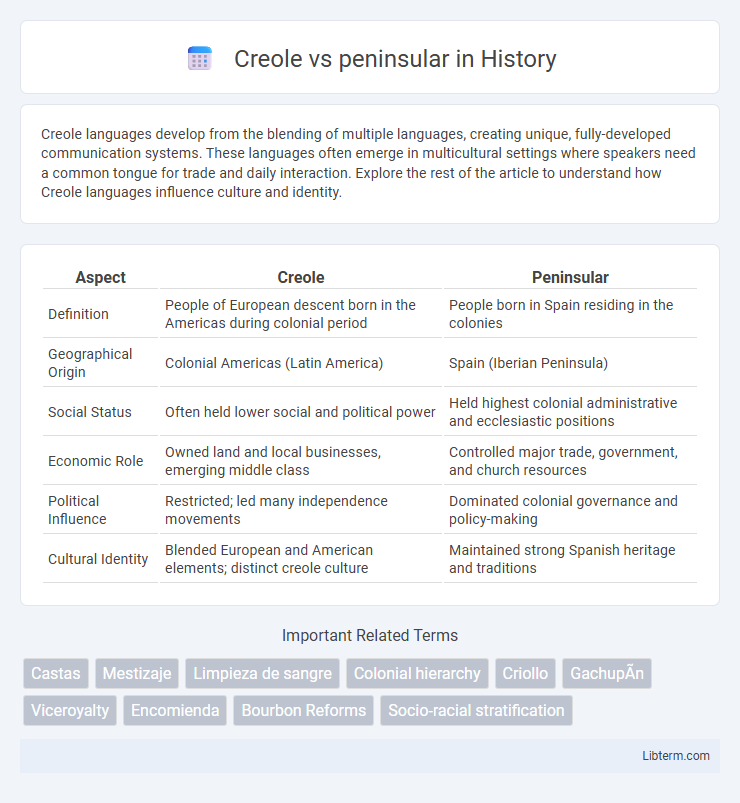Creole languages develop from the blending of multiple languages, creating unique, fully-developed communication systems. These languages often emerge in multicultural settings where speakers need a common tongue for trade and daily interaction. Explore the rest of the article to understand how Creole languages influence culture and identity.
Table of Comparison
| Aspect | Creole | Peninsular |
|---|---|---|
| Definition | People of European descent born in the Americas during colonial period | People born in Spain residing in the colonies |
| Geographical Origin | Colonial Americas (Latin America) | Spain (Iberian Peninsula) |
| Social Status | Often held lower social and political power | Held highest colonial administrative and ecclesiastic positions |
| Economic Role | Owned land and local businesses, emerging middle class | Controlled major trade, government, and church resources |
| Political Influence | Restricted; led many independence movements | Dominated colonial governance and policy-making |
| Cultural Identity | Blended European and American elements; distinct creole culture | Maintained strong Spanish heritage and traditions |
Introduction: Understanding Creole and Peninsular
Creole refers to people of European descent born in the colonies of the Americas, particularly in Spanish and Portuguese territories, while Peninsular designates individuals born in Spain or Portugal who held higher social and political status. This distinction shaped colonial societies by influencing power dynamics, with Peninsulars often occupying elite administrative and military positions, whereas Creoles sought greater autonomy and economic influence. Understanding the Creole and Peninsular divide is essential for analyzing colonial governance, social hierarchy, and the roots of independence movements in Latin America.
Historical Context of Creole and Peninsular Identities
Creole and Peninsular identities emerged during Spanish colonial rule in the Americas, marking social and racial hierarchies between locally born people of Spanish descent (Creoles) and Spain-born Spaniards (Peninsulares). Creoles often faced discrimination and exclusion from top administrative and ecclesiastical positions reserved for Peninsulares, fueling a sense of distinct identity and demanding political power. These tensions contributed significantly to early independence movements in Latin America, where Creoles sought to challenge Peninsular dominance and assert local control.
Geographic Distribution and Origins
Creole populations primarily originated in colonial regions such as the Caribbean, Louisiana, and parts of South America, where European settlers mixed with African and indigenous peoples, resulting in unique cultural and linguistic identities. Peninsular groups refer to Europeans born in the Iberian Peninsula, mainly Spain and Portugal, who exercised colonial authority in territories across the Americas and Africa. The geographic distribution of Creoles is concentrated in former colonial settlements with diverse indigenous and African influences, contrasting with peninsular populations who remained concentrated in Europe but maintained political and economic control overseas.
Linguistic Differences Between Creole and Peninsular
Creole languages exhibit significant linguistic differences from peninsular languages, primarily in grammar, vocabulary, and phonology due to their mixed origins and creolization processes. Creoles often simplify verb conjugations and employ reduced inflectional morphology compared to the complex verb paradigms and syntactic rules found in peninsular languages like standard Spanish, Portuguese, or French. Additionally, creoles integrate lexical items from multiple source languages, resulting in unique phonetic patterns and sentence structures that diverge substantially from the more standardized and historically continuous peninsular varieties.
Cultural Distinctions and Social Practices
Creole culture, shaped by the blending of African, European, and Indigenous influences, exhibits distinct culinary traditions, vibrant music, and unique religious practices such as Vodou and Santeria, contrasting with the more conservative, Catholic-centric customs of peninsular society. Social practices in Creole communities emphasize collective identity, oral storytelling, and communal celebrations, while peninsular groups often prioritize formal social hierarchies and rigid family structures. These cultural distinctions reflect deep-rooted historical experiences, with Creole identity embracing hybridity and resilience against colonial frameworks that defined peninsular norms.
Economic Roles and Social Hierarchies
Creoles, born in the Americas to Spanish parents, often held significant economic roles as landowners, merchants, and plantation owners, while peninsulares, Spanish-born settlers, dominated the highest administrative and political positions in colonial society. The social hierarchy privileged peninsulares for their direct ties to Spain, granting them exclusive access to government offices and military leadership, whereas Creoles occupied influential but secondary ranks, fostering tensions over economic power and political influence. These distinctions entrenched systemic inequalities that fueled Creole demands for greater autonomy and eventual independence movements across Spanish America.
Political Influence and Power Dynamics
Creoles, descendants of European settlers born in the Americas, held significant economic power but were often excluded from top political positions controlled by peninsulares, who were born in Spain and maintained dominance in colonial administration. The peninsulares' monopoly on political authority created tensions, as Creoles sought greater influence and representation in governing institutions. This power imbalance fueled independence movements across Latin America, where Creoles emerged as leaders challenging the peninsulares' control.
Creole vs Peninsular in Colonial Society
In colonial society, Creoles were individuals of European descent born in the Americas, distinct from Peninsulares who were born in Spain. Creoles often faced social and political limitations imposed by the Peninsulares, who held the highest administrative positions and controlled colonial governance. This hierarchical division fueled tensions that contributed to the emergence of independence movements across Latin America.
Modern Perceptions and Evolving Identities
Modern perceptions of Creole and Peninsular identities reveal dynamic cultural shifts influenced by globalization and historical context. Creole identity increasingly emphasizes cultural hybridity and resilience, celebrating a blend of African, European, and indigenous heritages. Peninsular identity often highlights traditional European roots, yet faces transformation as younger generations embrace multiculturalism and redefined national narratives.
Conclusion: Lasting Impacts of Creole and Peninsular Divisions
The division between Creole and peninsular populations created enduring social hierarchies that influenced political power and economic control in Latin America. Creoles, born in the Americas to European parents, often felt marginalized by peninsular elites appointed from Spain, fueling independence movements and shaping national identities. These distinctions left a legacy of cultural pride and social stratification that persisted well beyond colonial rule.
Creole Infographic

 libterm.com
libterm.com